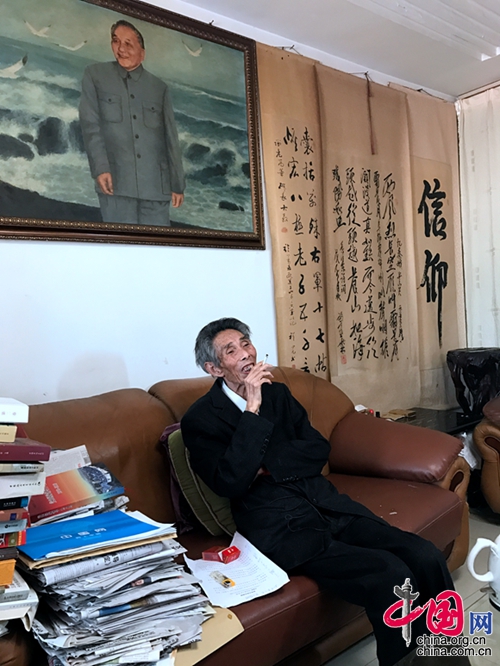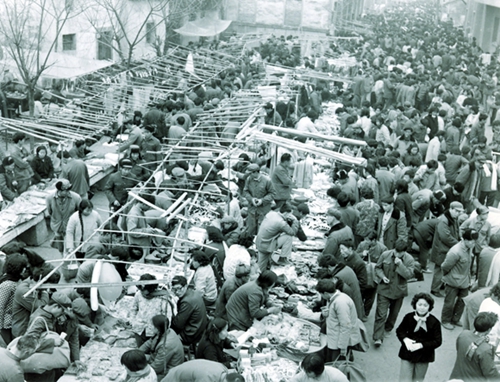Xie Gaohua: Founding father of world's largest small commodities market
- By He Shan
 0 Comment(s)
0 Comment(s) Print
Print E-mail China.org.cn, May 9, 2018
E-mail China.org.cn, May 9, 2018
In 1982, a new official in a poor rural county in China was moved by a local woman's struggles and gave her permission to sell shoelaces. The legend goes that this sparked the region's reform and opening up efforts in earnest, eventually turning it into the world's largest wholesale market of small commodities.
The county is Yiwu, in Zhejiang province, home to the world's renowned Yiwu small commodities market. The county official, Xie Gaohua, is now 87 years old, but he remembers the encounter clear as if it was yesterday. Sitting in his home, Xie recounted this fabled story and other circumstances that led to Yiwu's remarkable transformation.
From rags to riches
Xie was transferred from Quzhou, another town in Zhejiang province, to become the secretary of the Yiwu Party Committee in April 1982.

"Quzhou was poor then, but Yiwu was much poorer," Xie said. "People were starving and tried hard to survive. I had to do something."
But instead of giving orders and making comments straight away, as many did, Xie began by listening to local people and studying his new surroundings.
He found that a bartering business, exchanging brown sugar for chicken feathers -- a tradition that dates back to the Qing Dynasty a century ago -- still thrived in the area. The tradition had evolved into a booming hawking business, the main way for many local people to make a living.
In this, Xie discovered the hidden vigor of Yiwu's economy.
However, working as a hawker was forbidden after the founding of the People's Republic of China, as it was deemed as a "capitalist activity," the antithesis of the creed of the Communist Party.
Therefore, although the Chinese leadership proclaimed the beginning of the country's economic reform and opening up in 1978, few dared to support these activities in practice.
Then came the fateful encounter in May 1982, between Xie and a street vendor named Feng Aiqian.
"She met me outside the government building to complain after her goods were confiscated by local authorities again." Xie said. "I couldn't understand the Yiwu dialect, so our conversation was difficult and sounded like a quarrel, drawing many onlookers."
Not wanting to make a scene, Xie invited Feng to his office.
"Our talk softened after she offered me a cigarette," Xie recalled, looking fondly at the cigarette between his fingers — he still carried the habit. "She said she was doing business on the street to make money to support her poor family."
After more than one hour's conversation, Xie assured her that she would be allowed to peddle goods on the street.
The talk prompted him to travel to nearby Wenzhou, the first city in China to set up private enterprises, to do research.
"The more I learned, the more I thought building a free market conformed to the guiding principles given by the central government. It was not the capitalist practices that many feared."
Four months later, in September 1982, Yiwu announced that it would set up the Huqingmeng Market, at the time merely a collection of sheds and stalls. The market, however, would eventually grow into today's Yiwu small commodities market.

To develop the market, Xie put forward a guideline of "four allows" — allow farmers to do business, allow long-haul trans-port trade, allow the opening-up of the urban and rural market, and allow multi-channel competitions.
The bold move caused resentment among people working at State-owned businesses which took a beating from the free market competition.
"I visited a store department and heard some complaints, I told them the system was faulted and we should 'break the big pot.' (a slang referring to the egalitarian practice common in Chinese society in the early 1980s)
"To get rich through labor is respectable," Xie asserted. The sen-tence became a catchphrase in the ensuing years.
This was the first time in China that a local government officially recognized the legality of a free market for farmers and vendors.
Legitimizing the small-commodities market was no easy task, be-cause ideological shackles still gripped people's minds. Those in the authority were afraid to make bold moves, despite the direc-tives from the third plenary session of the 11th Central Committee of the Communist Party of China that was held four years before, which launched various measures of reform and opening up.
Xie's vision and boldness was a precious rarity that led the way.
In October 1984, he proposed a city development strategy called "prosper through trade and commerce," aiming to develop trade as Yiwu's pillar industry and foster a market.
The strategy was not conceived from the vacuum, but a result from what he saw and learned in his trips to Shenzhen, Zhuhai and Shanghai, all of which were pioneering cities that spearheaded China's reform and opening up.
"After visiting those cities, I found that there is always a market first, then there is a city," he said.
That was where the strategy came from.
Then he immersed himself in the works of Marxism, the guiding theory of the Communist Party of China, to search for doctrines to endorse his idea.
"I didn't claim to understand everything about Marxism," Xie, a farmer's son with only an elementary school education, acknowl-edged. "But I was convinced that the strategy won't go against it."
His development strategy proved to be right and put Yiwu on the path to prosperity with its small commodities economy ever since.
'Party officials must serve the people'
Despite his humble beginning, Xie had a flair for leadership. He held himself accountable, made bold decisions and was prepared to take risks.
He said, "Party officials must serve the people and should not go against the aspiration of the people."
He tried to shy away from public praise that he was the founding father of the Yiwu market, and instead attributed the success of the market to the spirit of Yiwu — pioneering, inclusive, hardworking and entrepreneurial.
Xie is not a Yiwu local, but he said he considered Yiwu as his second hometown.
Although Xie held his post in Yiwu for less than three years and left it over three decades ago, Yiwu's business people still feel indebted to him.
Every year since 2015, representatives from Yiwu's business community would drive Xie for 150 kilometers from his hometown in Quzhou to Yiwu to attend the China Yiwu International Commodities Fair.
He said he plans to attend the expo again this November.






Go to Forum >>0 Comment(s)